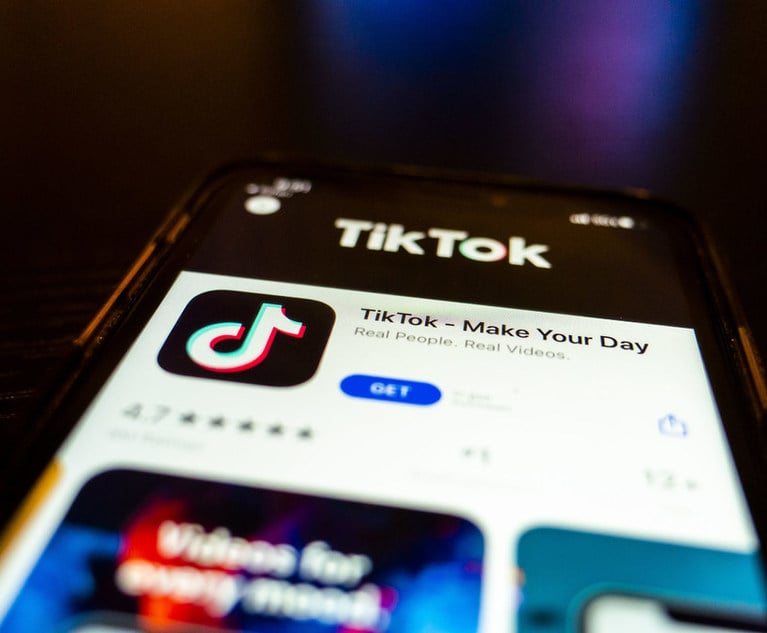For Lawyers, Social Distancing Could Be the New Normal
For legal professionals, this new virus has completely rewritten how business is done. Courthouses are closed, office buildings are empty and a lot of things that once were urgent have suddenly been put on indefinite hold.
April 13, 2020 at 12:29 PM
6 minute read
 Gerald Sauer, Sauer & Wagner (Photo: Courtesy photo)
Gerald Sauer, Sauer & Wagner (Photo: Courtesy photo)
The novel coronavirus pandemic is reshaping our world in ways large and small, from compulsive hand washing to take-out meals to home-schooling. As we're all forced to shelter in place, we find ourselves connecting with others in ways we may not have known about (e.g., Zoom), and in ways we never truly appreciated (e.g., email, texting, messaging).
For legal professionals, this new virus has completely rewritten how business is done. Courthouses are closed, office buildings are empty and a lot of things that once were urgent have suddenly been put on indefinite hold. We no longer meet in person with clients, we've stopped going to court, and we can't even enjoy collegial get-togethers to exchange business cards and referrals.
But the legal wheels still keep turning. People are still getting speeding tickets, and criminals are still getting arrested. People still need to get their wills done (as well as those oh-so-important health care directives). Lots of people still have serious legal problems that can't wait weeks or months to resolve and most lawyers are still open for business—from their bedrooms, kitchens and home offices.
Thanks to the wonders of modern technology, a lot of legal matters are still being managed. Courts are hearing motions, albeit now primarily via telephone and video calls. Notaries are actually offering their services, having figured out how to do so remotely. Mediations and arbitrations are occurring virtually, with the added bonus, in many instances, of lower costs and minimal disruption. There's no longer the need for travel, lodging, meals and other commonly associated expenses.
When the dust finally settles, whether that's this year or much later in 2021, it is a safe prediction that remote, virtual, and technology-supported legal practice—from depositions to document filing to trial appearances—will be the "new normal." For better or worse, we will not be returning to "business as usual." That legal world no longer exists.
This is actually where we've been heading for a long time. The marriage of law and technology has been inevitable; COVID-19 simply moved it into hyperdrive. The legal system, slowly and grudgingly, has been moving into the millennial age. I recall the advent, decades ago, of revolutionary IBM memory typewriters that for the first time allowed the recall of content. I also recall the early tribulations associated with online legal research, including universal dismissal of its merits and integrity. We've witnessed increased acceptance of service by email, and these days video and other once-unacceptable technologies are commonplace in the courtroom. It was bound to happen.
Now criminal defendants, who have a constitutional right to fair and speedy trials, are the technology beta test. Criminal trials, as well as live detention hearings and many sentencings, have been halted nationwide. Congress tried to address this in the federal Coronavirus Aid, Relief, and Economic Security Act (CARES Act), passed March 27, by opening the door for "authorizing the use of video and telephone conferencing, under certain circumstances and with the consent of the defendant, for various criminal case events during the course of the COVID-19 emergency." Section 15002(b)(1) of the CARES Act recognizes that criminal proceedings cannot be conducted in person without seriously jeopardizing public health and safety, and on March 29, the Judicial Conference of the United States found "that emergency conditions due to the national emergency declared by the president" with respect to COVID-19 "have materially affected and will materially affect the functioning of the federal courts generally," thus invoking the very procedures described in the act.
While criminal trials are stopped for now, pretrial hearings, juvenile dependency hearings and other nontrial proceedings are moving into the virtual world. Defendants, who have the right to appear before a judge, won't get to see their accusers, and defense lawyers are less able to negotiate with prosecutors. This raises clear constitutional questions in the absence of an emergency, but we are in an emergency now. Delayed hearings prevent the release of presumptively innocent defendants at a time when detention is far more dangerous than before the pandemic and the only alternative to consent by defendants is the continued detention until the pandemic is over. On its face, Section 15002, applies only for as long as the COVID-19 emergency remains in place, and it requires judicial findings to be revisited within 90 days, but it's an open question whether the courts will seek to expand the use of virtual proceedings after the pandemic passes. Could we see remote depositions, and even remote jury trials, as the accepted norm in a post-COVID-19 future?
Though criminal cases warrant heightened attention, civil plaintiffs seeking redress for their injuries arguably have no less need for timely justice. Workers wrongfully terminated from jobs, drivers and pedestrians seriously injured by others' negligence, and consumers scammed by unscrupulous operators don't have the luxury of waiting indefinitely to be made whole. Especially in times of economic uncertainty, these victims deserve their day in court. As it turns out, many judges don't care to hear oral arguments in order to render their decisions; they're happy to decide based on paper submissions. With Zoom and other remote applications, civil law and motion can easily be handled virtually or telephonically.
The upside of remote lawyering is apparent: less time spent in traffic and more efficiencies for attorneys who aren't required to appear in court and can handle multiple matters from a single location. But the downside is significant. Jury trials invoke a "human element" that is lost when people attend remotely. In every jury trial—but especially in criminal matters—jurors should be able to read body language and nonverbal cues. They should also be able to foster the group ethos that is fundamental to the jury experience. When we lose that connectivity, we may deprive parties of the justice to which they're entitled.
Where, exactly, are we heading in this brave new technology-driven legal world? Researchers have developed artificial intelligence capable of autonomously detecting deception in courtroom videos. Facial recognition software enables law enforcement and other government agencies to identify people and detect emotions. Could we be moving toward the world of Philip K. Dick's "Minority Report," where police apprehend criminals using psychic "foreknowledge"?
As we hunker down and weather this coronavirus, let's take the time now to map out this alternative futuristic world, to understand what we gain and what we give up when we relinquish the human touch. Remote lawyering is a blessing, but it will bring curses if we don't handle it properly and thoughtfully.
Gerald Sauer is a founding partner at Sauer & Wagner in Los Angeles. He focuses his practice on employment, business and intellectual property law.
This content has been archived. It is available through our partners, LexisNexis® and Bloomberg Law.
To view this content, please continue to their sites.
Not a Lexis Subscriber?
Subscribe Now
Not a Bloomberg Law Subscriber?
Subscribe Now
NOT FOR REPRINT
© 2025 ALM Global, LLC, All Rights Reserved. Request academic re-use from www.copyright.com. All other uses, submit a request to [email protected]. For more information visit Asset & Logo Licensing.
You Might Like
View All
Build It and They Will Come: Tips to Market Your Practice as a Junior Attorney
6 minute read
Yelp Sues Google for Alleged Antitrust Violations, Citing Previous 'Watershed' Government Ruling

There's Something in the Water: San Diego Is Once Again a Hot Market for National Law Firms
6 minute read
What Happens When You Go Viral? How a Law Firm Associate Manages Her Social Media Success
5 minute readTrending Stories
- 1Rejuvenation of a Sharp Employer Non-Compete Tool: Delaware Supreme Court Reinvigorates the Employee Choice Doctrine
- 2Mastering Litigation in New York’s Commercial Division Part V, Leave It to the Experts: Expert Discovery in the New York Commercial Division
- 3GOP-Led SEC Tightens Control Over Enforcement Investigations, Lawyers Say
- 4Transgender Care Fight Targets More Adults as Georgia, Other States Weigh Laws
- 5Roundup Special Master's Report Recommends Lead Counsel Get $0 in Common Benefit Fees
Who Got The Work
J. Brugh Lower of Gibbons has entered an appearance for industrial equipment supplier Devco Corporation in a pending trademark infringement lawsuit. The suit, accusing the defendant of selling knock-off Graco products, was filed Dec. 18 in New Jersey District Court by Rivkin Radler on behalf of Graco Inc. and Graco Minnesota. The case, assigned to U.S. District Judge Zahid N. Quraishi, is 3:24-cv-11294, Graco Inc. et al v. Devco Corporation.
Who Got The Work
Rebecca Maller-Stein and Kent A. Yalowitz of Arnold & Porter Kaye Scholer have entered their appearances for Hanaco Venture Capital and its executives, Lior Prosor and David Frankel, in a pending securities lawsuit. The action, filed on Dec. 24 in New York Southern District Court by Zell, Aron & Co. on behalf of Goldeneye Advisors, accuses the defendants of negligently and fraudulently managing the plaintiff's $1 million investment. The case, assigned to U.S. District Judge Vernon S. Broderick, is 1:24-cv-09918, Goldeneye Advisors, LLC v. Hanaco Venture Capital, Ltd. et al.
Who Got The Work
Attorneys from A&O Shearman has stepped in as defense counsel for Toronto-Dominion Bank and other defendants in a pending securities class action. The suit, filed Dec. 11 in New York Southern District Court by Bleichmar Fonti & Auld, accuses the defendants of concealing the bank's 'pervasive' deficiencies in regards to its compliance with the Bank Secrecy Act and the quality of its anti-money laundering controls. The case, assigned to U.S. District Judge Arun Subramanian, is 1:24-cv-09445, Gonzalez v. The Toronto-Dominion Bank et al.
Who Got The Work
Crown Castle International, a Pennsylvania company providing shared communications infrastructure, has turned to Luke D. Wolf of Gordon Rees Scully Mansukhani to fend off a pending breach-of-contract lawsuit. The court action, filed Nov. 25 in Michigan Eastern District Court by Hooper Hathaway PC on behalf of The Town Residences LLC, accuses Crown Castle of failing to transfer approximately $30,000 in utility payments from T-Mobile in breach of a roof-top lease and assignment agreement. The case, assigned to U.S. District Judge Susan K. Declercq, is 2:24-cv-13131, The Town Residences LLC v. T-Mobile US, Inc. et al.
Who Got The Work
Wilfred P. Coronato and Daniel M. Schwartz of McCarter & English have stepped in as defense counsel to Electrolux Home Products Inc. in a pending product liability lawsuit. The court action, filed Nov. 26 in New York Eastern District Court by Poulos Lopiccolo PC and Nagel Rice LLP on behalf of David Stern, alleges that the defendant's refrigerators’ drawers and shelving repeatedly break and fall apart within months after purchase. The case, assigned to U.S. District Judge Joan M. Azrack, is 2:24-cv-08204, Stern v. Electrolux Home Products, Inc.
Featured Firms
Law Offices of Gary Martin Hays & Associates, P.C.
(470) 294-1674
Law Offices of Mark E. Salomone
(857) 444-6468
Smith & Hassler
(713) 739-1250






